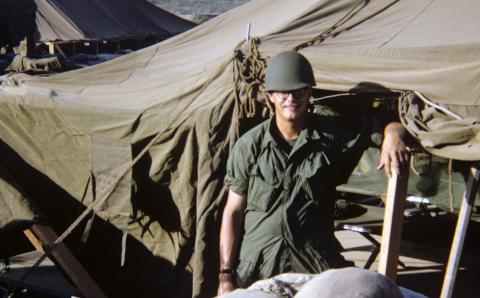“Calvin Theological Seminary prepared me well. It gave me a solid biblical, theological, and historical foundation that continues to ground me as I live, learn, and minister in diverse and constantly changing settings,” said Erika Dekker, a chaplain at Blodgett Hospital in Grand Rapids, Mich.
Dekker is among the five pastors who shared their experiences about what it means to be a pastor and how they serve in various ministry or pastoral contexts.
Each of these pastors—a chaplain, a Bible translator, a bivocational pastor, and congregational pastors in different settings—revealed that while they shared similar seminary training through their academic programs, their callings and pathways to ministry are as diverse as their backgrounds. They also reflected on the joys and challenges of ministry as well as their sources of encouragement along their journey, and they provided counsel to those who might be called to similar ministry contexts.
Equipping Pastors
For all five participants, preparation for ministry was primarily through a variety of seminary academic programs (Ph.D., M.Div., and Th.M.). This included experiential and contextual learning in a variety of ministry settings plus internships and additional training outside of seminary but related to specific ministry roles.
While the degree programs share similar courses, each pastor had a unique academic path to prepare them for their individual pastoral contexts.
Ann Kapteyn, for example, has worked for 22 years to help communities around the world translate the Bible into minority languages. She noted that training in biblical exegesis and languages, as well as in systematic theology and church history, were good preparation for her work in the international context, especially when it came to understanding historical theological disputes and being able to spot them as they come up in her work with Wycliffe Bible Translators and SIL International.
Bernard Ayoola is the pastor and director of the African Resource Center, a nonprofit meeting the social and spiritual needs of African immigrants in Grand Rapids, Mich. Rodrigo Cano is a community pastor for Community Christian Church in Aurora, Ill. They both said their training provided them with a deeper understanding of Reformed theology and a readiness to serve in contexts where those they serve are primarily from non-Reformed traditions.
“Over the years, the Reformed accents of kingdom, covenant and sovereignty have resonated effectively with the people I serve, some of whom are new to the gospel,” Ayoola said. “Some members of our community, for example, who arrived in the U.S. as refugees from very traumatic circumstances find comfort in knowing that God is aware of their situation and is willing and able to heal their physical and emotional wounds.”
For Laura de Jong, lead pastor at Second Christian Reformed Church in Grand Haven, Mich., her seminary training meant gaining key competencies including the “ability to unpack difficult theological issues, exploring the Bible, and practicing pastoral care.”
Dekker noted her seminary education helped her hone “the ability to think critically and wonder imaginatively.”
Beyond coursework and experiential, contextual learning at seminary, some saw a need for further training to prepare for their specific ministry. Kapteyn, for instance, took further training in linguistics, phonology, orthography, and discourse analysis for Bible translation, while Dekker participated in a yearlong Clinical Pastoral Education program followed by an examination process through the Association of Professionals Chaplains to become a Board-Certified Chaplain.
CPE in particular helped her not only to train as a chaplain but also to know herself more fully “in order to be able to offer (herself) as a safe, nonjudgmental, non-anxious presence in the face of deep pain and suffering.”
The Journey to Being A Pastor
“I went to seminary with the intention to become a chaplain,” Dekker said. “Along the way, this focus was challenged and broadened to include a yearlong stint as a pastor-intern in a congregation,” a formative experience that helped her realize she had a passion for preaching and leading worship.
However, after graduating from seminary, Dekker’s trajectory changed back to pursuing chaplaincy when many of the doors to pastoral ministry closed.
De Jong’s pathway to her current ministry and calling started after an undergraduate course in which she researched what the Christian Reformed Church could learn from Orthodox Judaism about incorporating ritual into worship and daily life. After seminary, de Jong received the call to Second CRC in Grand Haven.
As a bivocational pastor, Ayoola started his pastoral journey in Nigeria as director of music for a local church while also working as an engineer for 15 years. After moving to the U.S. with his family, he decided to pursue a full-time career in ministry. He earned an M.Div. at Grand Rapids Theological Seminary and a master’s degree in theology and a doctorate at Calvin Seminary. He also served as a pastoral intern and as a pastor at the African Community Fellowship and Kentwood Community Church in Grand Rapids before beginning his current ministry at the African Resource Center.
Cano’s journey to his current ministry began as a church planter. After seminary training in the Latino Ministry Program and M.Div. program, he was called to serve as a pastor at Community Christian Church.
After completing her master’s degree in theology at Calvin Seminary, Kapteyn started her ministry work with Wycliffe/SIL, where she has worked on Bible translation in Cameroon, Brazil, and now in the Central African Republic.
Joys and Challenges of Ministry
Because the gospel is holistic, Ayolla said, serving those in need means meeting their physical, economic, and emotional needs, not just spiritual needs. “We do not bifurcate spiritual activities from those that ultimately meet physical, economic, or emotional needs,” he said. “The gospel is holistic; God meets us at our point of need.”
Still, the greatest joy that comes with being a pastor, Cano said, is “being able to be with people in their most important moments of their lives; it is a great privilege and a great responsibility.”
This response was unequivocally shared by all respondents, noting their greatest sense of joy comes from walking alongside and ministering to those they serve through their joys and sorrows. For these pastors, “walking alongside” means grieving with those in sorrow, praying for those who are sick, and providing material resources for those in need.
“This might seem like a strange way to talk about joy,” Dekker said, “but ultimately a truly good chaplain/pastoral care visit is one in which I and another person encounter one another as the broken, beautiful human creatures that we are. The word ‘God’ might not even be mentioned, but through the power of the Holy Spirit, I know deep in my bones that God was, is, and will be in all of this.”
Responding to needs with prayer, a word of encouragement, and material resources and then seeing how God uses their gifts to comfort, encourage, and guide their congregants gives each of these pastors and ministry leaders a great sense of gratitude and awe in light of the work of the Holy Spirit.
The five pastors also seem to face similar challenges, ones that are not unusual given the diverse ministries in which they serve. These range from navigating multicultural, multiethnic, and international settings to working with people of different faith and religious backgrounds and even simply to navigating the administrative components of the work.
But the joy of serving always shines through, as Kapteyn explained about her own experience: “The challenges of living in a country far from your passport country are many, and the culture shock can run deep. But beyond discovering a new country, the best part is joining and learning to love a community of brothers and sisters in Christ in a very different culture.”
Sources of Encouragement
Mentors and coaches within and outside of ministry, ministry peers, spiritual directors, and home church ministries such as small groups are among the places where pastors and ministry leaders draw strength and encouragement for their ministry work.
The five pastors interviewed mentioned that ministry peers provide counsel and encouragement, engage them in discussions about current issues in their shared ministries, encourage them, and pray with and for them.
“(Our area) pastors meet monthly to discuss how our ministries are going, what challenges we’re facing, and to encourage and pray for each other,” de Jong said. “All these relationships remind me that I’m never alone in this, and (we) are witnesses to God’s faithfulness in the lives of those he’s called into ministry.”
The respondents also said that resources such as podcasts, books, and conferences provide encouragement, inspiration, and instruction too.
Advice to Seminary Students Thinking of Similar Ministries
During seminary training, students should strongly consider signing up for Clinical Pastoral Education to explore gifts, passion, and ministry, these five pastors said. They also suggested shadowing pastors, chaplains, and other ministry leaders.
Those preparing for ministry in intercultural settings should start early by “cultivating cross-cultural friendships while at seminary,” Kapteyn advised.
Dekker noted that if one wants to pursue chaplaincy, they should “talk to chaplains who are in different areas of ministry and see what resonates with you. While there are many similarities, there are also many and significant differences among the different chaplain settings, such as hospitals, the military, prisons, workplaces, hospice, long-term care, (or) mental health.”
In the process of discerning one’s ministry calling, listening to where God is leading one to serve is important.
“Look for where God’s grace is needed, and pitch your tent there!” said Ayoola. “Many seminary students think they know where they would like to work after graduation. Meanwhile, God may be leading them in a different direction.”
Finally, once actively serving in ministry, continuing education, finding a mentor, and being in a peer group are highly recommended.
“You’re always learning as a pastor about theology and Scripture, but also about your congregation,” de Jong said. “If you keep asking questions of both, hopefully you’ll be able to speak the good news to your congregation in ways your people uniquely need to hear it.”
Ultimately, it’s important never to lose sight of the reason for ministry. Cano said: “Never lose the sense of awe (at) knowing that God uses people like you to minister to other people.”
About the Author
Margaret Mwenda, Calvin Theological Seminary







